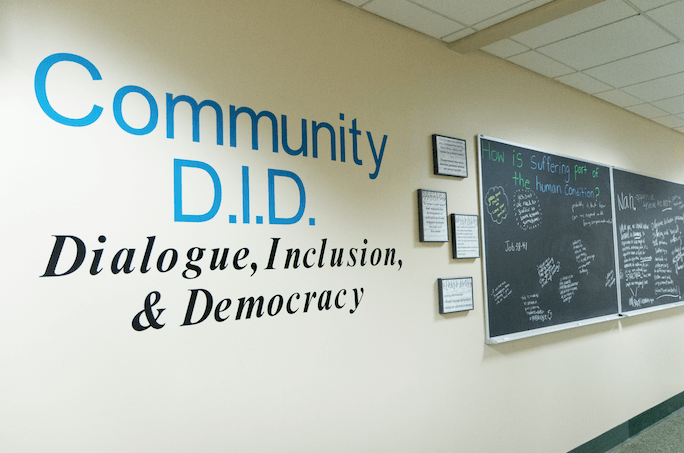by The Cowl Editor on November 8, 2018
Campus

by Kelly Wheeler ’21
Opinion Staff
Today’s world is full of difficult and divisive issues. Tensions and varying opinions are bound to develop on campus, especially in light of recent events like last week’s mass shooting at the Tree of Life synagogue in Pittsburgh.
But is there a place here at Providence College where people can express their thoughts and listen to those of others in a respectful environment?
Thankfully, PC’s global studies department realized the need for discussions like these on campus. In the hopes of facilitating conversations about difficult topics between members of the PC community, a global studies class called Dialogue, Inclusion, and Democracy recently created the Community D.I.D. Wall on the third floor of the Feinstein Academic Center.
The D.I.D. Wall is a chalkboard that presents a new question every two weeks for students, faculty, and staff members to respond to. Dr. Nicholas Longo, the instructor of the class responsible for the wall, says, “[The Community D.I.D Wall] is a collective group project that the students have taken on. They came up with the name of the wall, they designed the wall, and they have groups that are coming up with the questions.”
The first question was posted on Oct. 23, and it provoked a lively discussion about free speech by asking, “What differentiates hate speech and free speech?”
Given that one of the Friar Four Foundational Pillars is “Contemplation and Communication,” the Community D.I.D. Wall aligns perfectly with PC’s values.
When asked about the purpose of the wall, Quess-Symphonee Johnson ’21, a member of the Dialogue, Inclusion, and Democracy class, said, “It is an opportunity to start conversations that people don’t necessarily have, especially when they’re on opposite ends of the question.”
The D.I.D. Wall recognizes the power that conversations can have by affording people opportunities to voice their own thoughts while also exposing them to the thoughts of others.
Every person views the world differently according to their personal life experiences. Thus, by reading and learning from other people’s contributions to the D.I.D. Wall, members of the PC community will hopefully be prompted to think harder about their own beliefs.
The D.I.D. Wall was only recently established, so it is still too early to determine how successful it will be in prompting conversations. However, the wall has a lot of potential in helping the PC community become more educated and open-minded.
Fiona Pearlman ’20, another student involved in the creation of the D.I.D. Wall, says, “As long as word gets out about the wall, I think it will be very impactful on our campus by giving our community a unique way to work through hard topics.”
Although it is hidden away on the third floor of Feinstein and requires a trek up a flight of stairs to get to it, the Community D.I.D. Wall is something that all students, faculty, and staff members should see and participate in. Everyone should take advantage of the D.I.D. Wall. The civil discourse that it encourages can greatly benefit our campus.